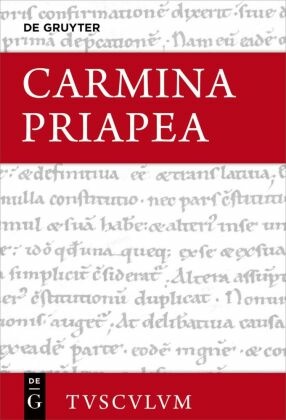
Carmina Priapea - Griechisch - lateinisch - deutsch
| Verlag | De Gruyter |
| Auflage | 2021 |
| Seiten | 234 |
| Format | 11,7 x 17,3 x 18,0 cm |
| Gewicht | 334 g |
| Reihe | Sammlung Tusculum |
| ISBN-10 | 3110751364 |
| ISBN-13 | 9783110751369 |
| Bestell-Nr | 11075136A |
Der Gartengott Priap, als hölzerne Statue mit übergroßem, rot bemaltem Phallus und einer Sichel in der Hand dargestellt, soll Diebe abwehren. Seine obszön wirkende Erscheinung hat immer wieder griechische und lateinische Verfasser von Gedichten dazu angeregt, mehr oder weniger anzüglich über ihn zu schreiben. Am weitesten ging dabei ein unbekannter Poet wahrscheinlich des 2. Jahrhunderts n. Chr., der in einem der Person Priaps gewidmeten, sorgfältig komponierten und intertextuell mit klassischer Poesie vernetzten Gedichtbuch den Gott die Eindringlinge in sein Reich mit der von ihm abstehenden 'Waffe' auf dreierlei Weise 'bestrafen' lässt. Der Band enthält außer diesem Corpus Priapeorum genannten Buch die Priap-Dichtungen älterer und jüngerer Dichter, darunter Theokrit, Catull, Vergil, Horaz, Tibull, Ovid, Petron und Prudentius mit Erläuterungen. Die Einführung informiert über den Priap-Kult und ordnet die Texte literaturgeschichtlich ein; ein Essay zu dem sehr reichen Fortwirken d er Priap-Poesie seit der frühen Neuzeit behandelt u.a. die Rezeption durch Lessing und Goethe.
The garden god Priapus, depicted as a wooden statue with an oversized, red-painted phallus and a sickle in his hand, is said to ward off thieves. His obscene appearance has repeatedly inspired Greek and Latin poets to write more or less suggestive poems about him. An unknown poet, probably from the 2nd century AD, went the furthest in a book of poems dedicated to Priapus, carefully composed and intertextually linked with classical poetry, in which the god 'punishes' the intruders in his realm in three different ways with the 'weapon' sticking out from him.
In addition to this book, called Corpus Priapeorum, the volume contains the Priapus poems of older and more recent poets, including Theocritus, Catullus, Virgil, Horace, Tibullus, Ovid, Petron and Prudentius with explanatory notes. The introduction provides information on the Priapus cult and categorises the texts in terms of literary history; an essay on the very rich influence of Priapus poetry since the early m odern period deals with the reception by Lessing and Goethe, among others.
